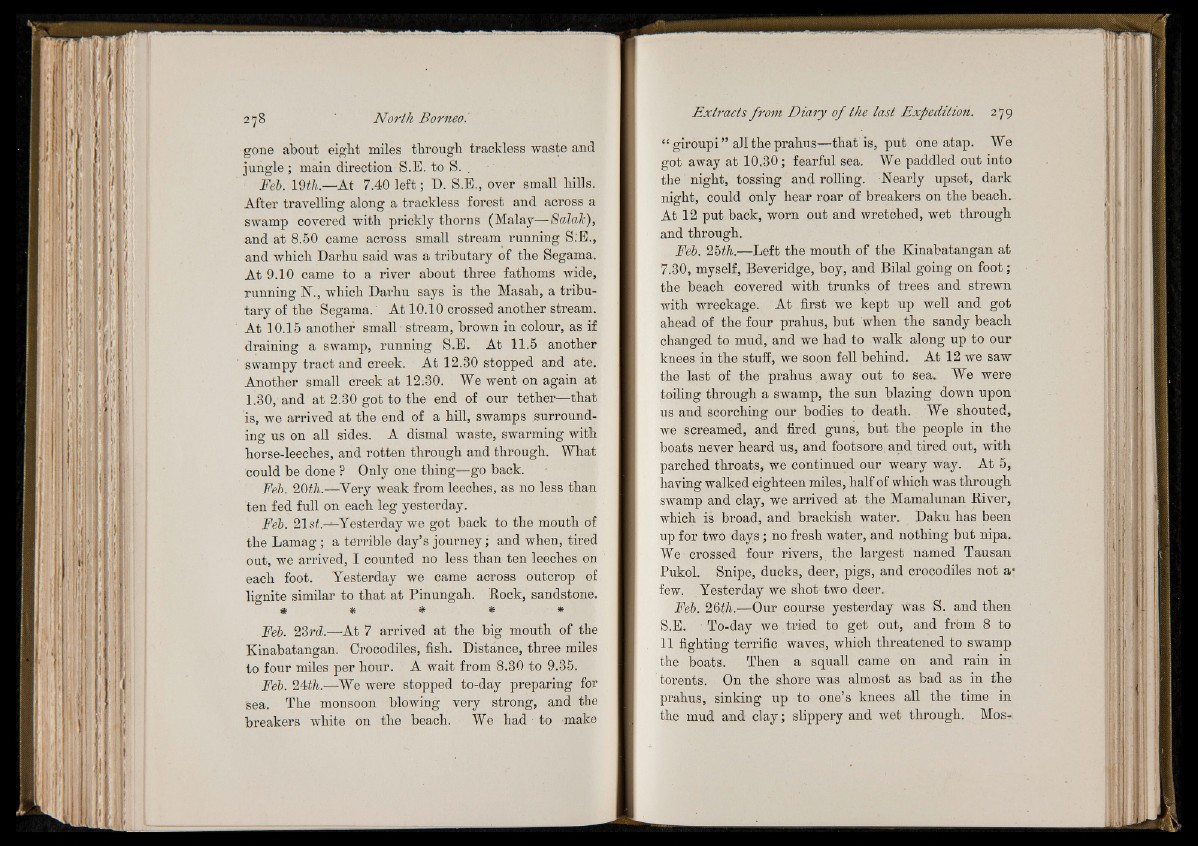
gone about eigbt miles through trackless waste and
ju n g le ; main direction S.E. to S. ,
Feb. 19th.—At 7.40 left; D. S.E., over small hills.
After travelling along a trackless forest and across a
swamp covered with prickly thorns (Malay—Salalc),
and at 8.50 came across small stream running S:E.,
and which Darhu said was a tributary of the Segama.
At 9.10 came to a river about three fathoms wide,
running 1ST., which Dai'hu says is the Masab, a tributary
of the Segama. At 10.10 crossed another stream.
At 10.15 another small stream, brown in colour, as if
draining a swamp, running S.E. At 11.5 another
swampy tract and creek. At 12.30 stopped and ate.
Another small creek at 12:30. We went on again at
1.30, and at 2.30 got to the end of our tether—that
is, we arrived at the end of a hill, swamps .surrounding
us on all sides. A dismal waste, swarming with
horse-leeches, and rotten through and through. What
could be done ? Only one thing—go back.
Feb. 20th.—Very weak from leeches, as no less than
ten fed full on each leg yesterday.
Feb. 2 1 si.-=-Yesterday we got back to the mouth of
th eL am ag ; a terrible day’s journey; and when, tired
out, we arrived, I counted no less than ten leeches on
each foot. Yesterday we came across outcrop of
lignite similar to that at Pinungah. Rock, sandstone.
* * * * *
Feb. 22>rd.—At 7 arrived at the big mouth of the
Kinabatangan. Crocodiles, fish. Distance, three miles
to four miles per hour. A wait from 8.30 to 9.35.
Feb. 24th.—We were stopped to-day preparing for
sea. The monsoon blowing very strong, and the
breakers white on the beach. We had to make
“ giroupi ” all the prahus—that is, put one atap. We
got away at 10.30; fearful sea. We paddled out into
the night, tossing and rolling. Nearly upset, dark
night, could only hear roar of breakers on the beach.
At 12 put back, worn out and wretched, wet through
and through.
Feb. 25th.—Left the mouth of the Kinabatangan at
7.30, myself, Beveridge, boy, and Bilal going on foot;
the beach covered with trunks of trees and strewn
with wreckage. At first we kept up well and got
ahead of the four prahus, but when the sandy beach
changed to mud, and we had to walk along up to our
knees in the stuff, we soon fell behind. At 12 we saw
the last of the prahus away out to sea. We were
toiling through a swamp, the sun blazing down upon
us and scorching our bodies to death. We shouted,
we screamed, and fired guns, but the people in the
boats never heard us, and footsore, and tired out, with
parched throats, we continued our weary way. At 5,
having walked eighteen miles, half of which was through
swamp and clay, we arrived at the Mamalunan River,
which is broad, and brackish water. Daku has been
up for two days; no fresh water, and nothing but nipa.
We -crossed four rivers, the largest named Tausan
Pukol. Snipe, ducks, deer, pigs, and crocodiles not a*
few. Yesterday we shot two deer.
Feb. 26th.—Our course yesterday was S. and then
S.E. To-day we tried to get out, and frbin 8 to
11 fighting terrific waves, which threatened to swamp
the boats. Then a squall came on and rain in
torents. On the shore was almost as bad as in the
prahus, sinking up to one’s knees all the time in
the mud and clay; slippery and wet through. Mos